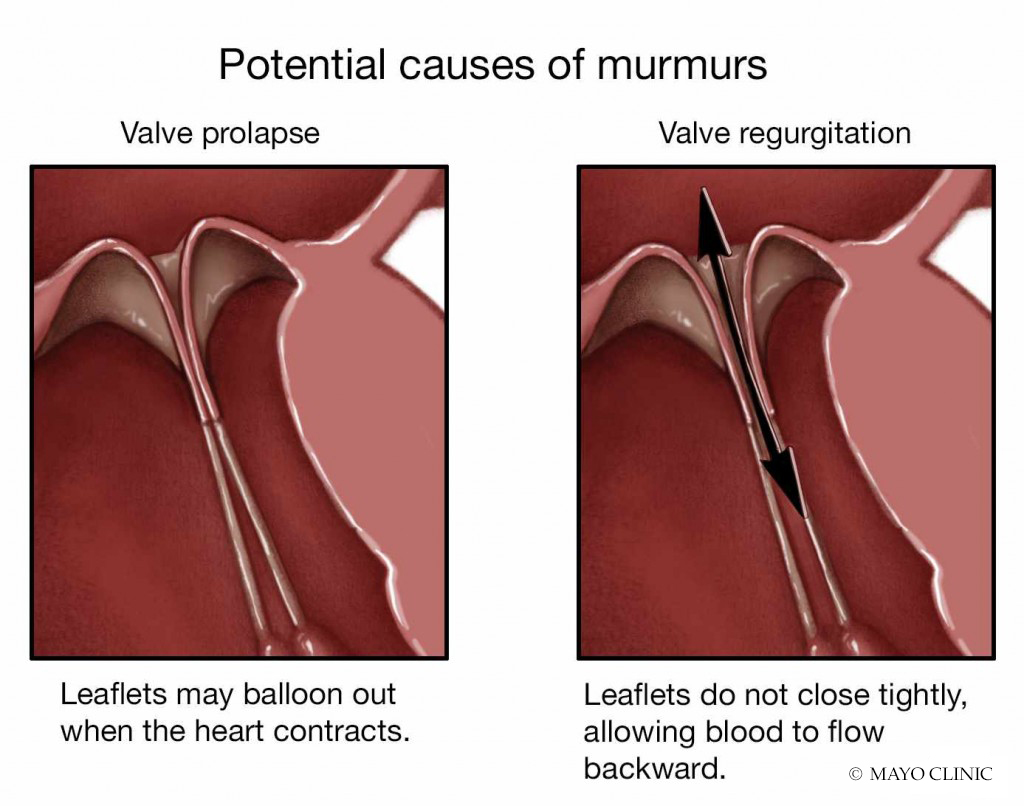-
Cardiovascular
What do you know about heart murmurs?
 Heart murmurs are sounds during your heartbeat cycle — such as whooshing or swishing — made by turbulent blood in or near your heart. These sounds can be heard with a stethoscope. A normal heartbeat makes two sounds like "lubb-dupp" (sometimes described as "lub-DUP"), which are the sounds of your heart valves closing.
Heart murmurs are sounds during your heartbeat cycle — such as whooshing or swishing — made by turbulent blood in or near your heart. These sounds can be heard with a stethoscope. A normal heartbeat makes two sounds like "lubb-dupp" (sometimes described as "lub-DUP"), which are the sounds of your heart valves closing.
Heart murmurs can be present at birth (congenital) or develop later in life. A heart murmur isn't a disease — but murmurs may indicate an underlying heart problem.
Often, heart murmurs are harmless (innocent) and don't need treatment. Some heart murmurs may require follow-up tests to be sure the murmur isn't caused by a serious underlying heart condition. Treatment, if needed, is directed at the cause of your heart murmur.
Symptoms
If you have a harmless heart murmur, more commonly known as an innocent heart murmur, you likely won't have any other signs or symptoms.
An abnormal heart murmur may cause no obvious other signs or symptoms, aside from the unusual sound your health care provider hears when listening to your heart with a stethoscope. But if you have these signs or symptoms, they may indicate a heart problem:
- Skin that appears blue, especially on your fingertips and lips
- Swelling or sudden weight gain
- Shortness of breath
- Chronic cough
- Enlarged liver
- Enlarged neck veins
- Poor appetite and failure to grow normally (in infants)
- Heavy sweating with minimal or no exertion
- Chest pain
- Dizziness
- Fainting
Most heart murmurs aren't serious, but if you think you or your child has a heart murmur, make an appointment to see your family health care provider. He or she can tell you if your heart murmur is innocent and doesn't require any further treatment or if an underlying heart problem needs to be further examined.
Causes
There are two types of heart murmurs: innocent murmurs and abnormal murmurs. A person with an innocent murmur has a normal heart. This type of heart murmur is common in newborns and children.
An abnormal heart murmur is more serious. In children, abnormal murmurs are usually caused by congenital heart disease. In adults, abnormal murmurs are most often due to acquired heart valve problems.
Innocent heart murmurs
An innocent murmur can occur when blood flows more rapidly than normal through the heart. Conditions that may cause rapid blood flow through your heart, resulting in an innocent heart murmur, include:
- Physical activity or exercise
- Pregnancy
- Fever
- Not having enough healthy red blood cells to carry adequate oxygen to your body tissues (anemia)
- An excessive amount of thyroid hormone in your body (hyperthyroidism)
- Phases of rapid growth, such as adolescence
Innocent heart murmurs may disappear over time, or they may last your entire life without ever causing further health problems.
Abnormal heart murmurs
The most common cause of abnormal murmurs in children is when babies are born with structural problems of the heart (congenital heart defects).
Common congenital defects that cause heart murmurs include:
- Holes in the heart or cardiac shunts.
Known as septal defects, holes in the heart may or may not be serious, depending on the size of the hole and its location. Cardiac shunts occur when there's an abnormal blood flow between the heart chambers or blood vessels, which may lead to a heart murmur. - Heart valve abnormalities.
Congenital heart valve abnormalities are present at birth, but sometimes aren't discovered until much later in life. Examples include valves that don't allow enough blood through them (stenosis) or those that don't close properly and leak (regurgitation).
Other causes of abnormal heart murmurs include infections and conditions that damage the structures of the heart and are more common in older children or adults. For example:
- Valve calcification.
This hardening or thickening of valves, as in mitral stenosis or aortic valve stenosis, can occur as you age. Valves may become narrowed (stenotic), making it harder for blood to flow through your heart, resulting in murmurs. - Endocarditis.
This infection of the inner lining of your heart and valves typically occurs when bacteria or other germs from another part of your body, such as your mouth, spread through your bloodstream and lodge in your heart.Left untreated, endocarditis can damage or destroy your heart valves. This condition usually occurs in people who already have heart valve abnormalities. - Rheumatic fever.
Although now rare in the United States, rheumatic fever is a serious condition that can occur when you don't receive prompt or complete treatment for a strep throat infection. It can permanently affect the heart valves and interfere with normal blood flow through your heart.
Risk factors
There are risk factors that increase your chances of developing a heart murmur, including:
- Family history of a heart defect.
If blood relatives have had a heart defect, that increases the likelihood you or your child may also have a heart defect and heart murmur. - Certain medical conditions.
Uncontrolled high blood pressure (hypertension), hyperthyroidism, an infection of the lining of the heart (endocarditis), high blood pressure in the lungs (pulmonary hypertension), carcinoid syndrome, hypereosinophilic syndrome, systemic lupus erythematosus, rheumatoid arthritis, a weakened heart muscle or a history of rheumatic fever, can increase your risk of a heart murmur later in life.
Factors that increase your baby's risk of developing a heart murmur include:
- Illnesses during pregnancy.
Having some conditions during pregnancy, such as uncontrolled diabetes or a rubella infection, increases your baby's risk of developing heart defects and a heart murmur. - Taking certain medications or illegal drugs during pregnancy.
Use of certain medications, alcohol or drugs can harm a developing baby, leading to heart defects.
Learn more about diagnosis and treatment.
This article is written by Mayo Clinic staff. Find more health and medical information on mayoclinic.org.







